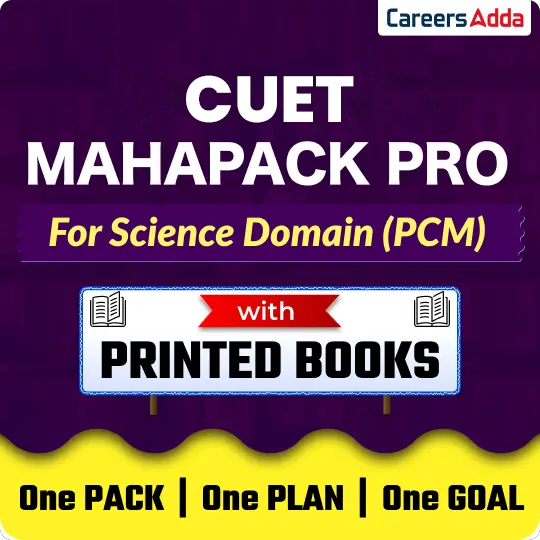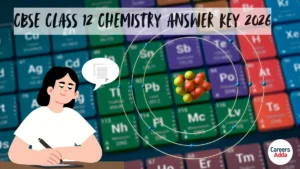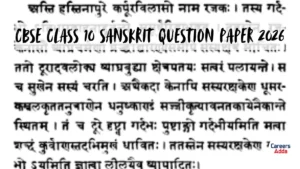The Central Board of Secondary Education (CBSE) announced the CBSE Class 12th Computer Science Syllabus 2025-26, which is aimed at imparting to the students basic knowledge of programming, problem-solving, and computational thinking. The new syllabus encourages learning through the practice of exercises, the use of algorithmic thinking, and programming using Python. For students to be able to map out a well-structured study plan and score good marks in board exams, they must first comprehend the revised syllabus.
From this article, you will get the most updated Computer Science syllabus for Class 12, 2025-26, practical syllabus, preparation tips, and other material.
CBSE Class 12 Computer Science Syllabus 2025-26
The CBSE Class 12 computer science test is a 100-mark test, with 70 marks allocated to the theory and 30 marks to the practicals. The theoretical exam consists of three units, whereas the practical exam includes a lab test, a report file, a project, and a viva form. The topics will cover the course, such as Computational Thinking and Programming – 2, Computer Networks, and Database Management. Students can also attempt the CBSE Class 12 Computer Science Previous Year Question Paper to familiarize themselves with the level of difficulty and the kind of questions that will be asked in the computer science exam.
Unit I: Computational Thinking and Programming – 2
Unit 1 of the Computer Science Class 12 Syllabus includes Basic Python, functions, Python libraries, and a variety of other advanced topics in computational thinking and programming. Now, let’s see the Unit 1 syllabus mentioned below:
| Topic | Content |
| Revision of Python (Class XI) | Quick review of concepts learned in Class XI, including basics of Python programming. |
| Functions | – Types of functions: built-in, module-based, and user-defined.- Creating user-defined functions.- Arguments & parameters (default, positional).- Return values, execution flow, scope (local/global). |
| Exception Handling | Introduction to exceptions and error handling using try, except, and finally blocks. |
| Introduction to Files | Overview of file types: Text files, Binary files, CSV files; difference between relative and absolute file paths. |
| Text Files | – Opening & closing files.- File modes: r, r+, w, w+, a, a+- Writing using write() and writelines()- Reading using read(), readline(), readlines().- Using seek() and tell()- Data manipulation. |
| Binary Files | – File modes: rb, rb+, wb, wb+, ab, ab+- Using the pickle module.- dump() and load() methods.- Operations: create, read, search, append, update. |
| CSV Files | – Importing csv module.- Opening and closing CSV files.- Writing with writer(), writerow(), writerows()- Reading with reader(). |
| Data Structures – Stacks | Introduction to stacks, stack operations (push & pop), and implementation using Python lists. |
Unit II: Computer Networks
This unit includes Networking and Communication technology. Read the table mentioned below:
| Topic | Content |
|---|---|
| Evolution of Networking | Introduction to computer networks; historical development including ARPANET, NSFNET, and the Internet. |
| Data Communication Terminologies | Key communication concepts: components (sender, receiver, message, medium, protocols); measurement of media capacity (bandwidth, data transfer rate); IP addressing; switching techniques (Circuit & Packet switching). |
| Transmission Media | – Wired: Twisted Pair Cable, Co-axial Cable, Fiber-optic Cable.- Wireless: Radio Waves, Microwaves, Infrared Waves. |
| Network Devices | Overview of devices: Modem, Ethernet Card, RJ45, Repeater, Hub, Switch, Router, Gateway, Wi-Fi Card. |
| Network Topologies & Types | – Types of Networks: PAN, LAN, MAN, WAN.- Topologies: Bus, Star, Tree. |
| Network Protocols | Common protocols: HTTP, HTTPS, FTP, PPP, SMTP, TCP/IP, POP3, TELNET, VoIP. |
| Introduction to Web Services | Concepts of WWW, HTML, XML, domain names, URLs, websites, browsers, servers, and web hosting. |
Unit III: Database Management
The detailed syllabus for Database and Management is mentioned below:
| Topic | Content |
| Database Concepts | Introduction to databases, their importance, and role in data storage and management. |
| Relational Data Model | Fundamental concepts: relation, attribute, tuple, domain, degree, cardinality; types of keys – candidate key, primary key, alternate key, foreign key. |
| Structured Query Language (SQL) | – Introduction to SQL.- DDL & DML commands.- Data types: char(n), varchar(n), int, float, date.- Constraints: NOT NULL, UNIQUE, PRIMARY KEY.- Database operations: CREATE, USE, SHOW, DROP.- Table operations: CREATE, DESCRIBE, ALTER, DROP.- Data manipulation: INSERT, DELETE, SELECT, UPDATE.- Clauses & operators: WHERE, IN, BETWEEN, ORDER BY, NULL, LIKE.- Aliasing, DISTINCT clause.- Aggregate functions: COUNT(), SUM(), AVG(), MIN(), MAX().- Grouping: GROUP BY, HAVING.- Joins: Cartesian product, equi-join, natural join. |
| Python-SQL Interface | – Connecting Python with SQL databases.- Executing queries: INSERT, UPDATE, DELETE using a cursor.- Retrieving data with connect(), cursor(), execute(), commit(), fetchone(), fetchall(), rowcount.- Developing database connectivity applications.- Using format specifiers in SQL queries. |
CBSE Class 12 Computer Science Syllabus PDF 2025-26
The syllabus for the CBSE Class 12 Computer Science course for the 2025-26 academic year is going to be a helpful resource for the students of the Computer Science course. Students can download the CBSE Class 12 Computer Science Syllabus in PDF format from the link below. Students can also download the syllabus from the official website(cbseacademic.nic.in).
CBSE Class 12 Computer Science Syllabus 2025-26 PDF
CBSE Class 12 Computer Science Theory Marking Scheme 2025-26
The total marks of the CBSE Class 12 Computer Science exam are 100. Out of 100, there will be a practical exam, for which students will receive a total of 30 marks. After the practicals, the board conducts a theoretical examination of 70 marks. The syllabus of CBSE Class 12 Computer Science is divided into three parts: Computational Thinking and Programming – 2, Computer Networks, and Database Management.
| Unit No. | Unit Name | Marks |
|---|---|---|
| I | Computational Thinking & Programming – II | 40 |
| II | Computer Networks | 10 |
| III | Database Management | 20 |
| Total | 70 |
CBSE Class 12 Computer Science: Practical Syllabus 2025-26
The CBSE Class 12 Computer Science Practical Syllabus 2025-26 has a significant impact on the students in programming, databases, and networking through its application. The practical syllabus concentrates on Python programming, file handling, and project work that have become an integral part of the student’s everyday life to achieve practical skills.
| Recommendation | Details |
| Project Goal | Develop realistic and usable applications using Python file handling or Python-SQL connectivity. |
| Team Size & Timeline | Projects should be done in groups of 2–3 students and started at least six months before submission. |
| Real-World Relevance | Projects should solve practical problems, e.g., software for invoice generation under GST regulations. |
| Innovation & Libraries | Encourage the use of Python libraries for diverse applications such as games, educational tools, accessibility solutions, and mobile apps. |
| Self-Learning | Motivate students to engage in independent research and self-study to broaden their knowledge. |
| Ethics & Originality | Emphasize the importance of avoiding plagiarism and respecting copyright while working on projects. |
Preparation Tips for Class 12 Computer Science Exam 2025-26
Below are some expert tips to help you score well:
- Python programs you must practice: Recursion, file handling, and pandas should be practiced.
- You must practice SQL queries – Write SQL queries daily. Your practice should encompass SQL joins and aggregate functions.
- Prepare your practical file and project well ahead of time – Don’t wait until the last minute.
- Sample papers and past year question papers – Many of the questions are repeated from year to year with minor updates.
- Don’t skip Boolean algebra and Networking – These topics are purely theoretical and can earn marks on an exam.
- Society, Law & Ethics – The exam may contain 2-3 mark questions testing your knowledge on definitions and examples.
- Practice writing code on paper – Your exams will be pen-paper-based.










 CBSE Class 12 Chemistry Answer Key 2026 ...
CBSE Class 12 Chemistry Answer Key 2026 ...
 CBSE Class 10 Sanskrit Question Paper 20...
CBSE Class 10 Sanskrit Question Paper 20...
 CUET PG Cut Off 2026, Expected Course wi...
CUET PG Cut Off 2026, Expected Course wi...














